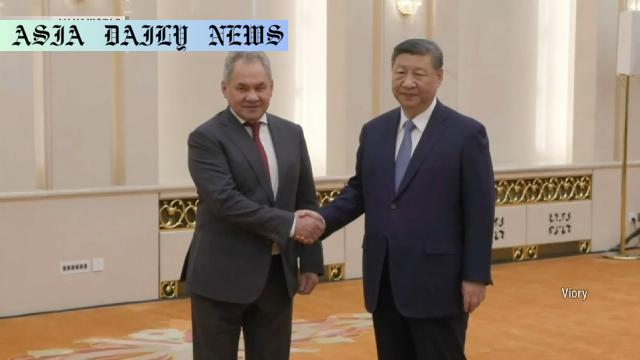Shoigu praised China’s efforts toward peace in Ukraine and highlighted strong bilateral ties as a model of world power relations.
Shoigu praised China’s efforts towards peace in Ukraine.
He described their ties as a model of strong world power relations.
China’s Xi emphasized continuous deepening of their strategic cooperation.

Shoigu’s Careful Diplomacy with China
Sergei Shoigu, Secretary of Russia’s Security Council, has employed a tactful and strategic discourse in discussions with Chinese President Xi Jinping. Meeting in Beijing, Shoigu commended China’s ongoing advocacy for a peaceful resolution to the crisis in Ukraine. His remarks highlighted Russia’s commitment to building a cooperative and positive rapport with China, moving away from aggressive rhetoric about counteracting the West. This approach signals Russia’s intent to bolster partnerships without antagonizing other global powers.
During the high-stake meeting, Shoigu acknowledged the geopolitical significance of the Russia-China alliance. Such cooperation, he noted, stands as a model for global power relations. Steering clear of direct confrontations with Washington, this diplomatic tact displays Russia’s increased willingness to engage in international discourse based on shared goals with China, such as stability and economic partnerships.
China’s Role in the Global Diplomatic Arena
President Xi’s response underlines China’s commitment to its role as a global facilitator of peace and cooperative dialogue. Xi emphasized that China seeks to “continuously deepen” strategic and practical partnerships with Russia, reiterating his country’s focus on creating mutually beneficial agreements. This aligns with China’s broader foreign policy of pursuing diplomatic leadership through soft power rather than military provocations.
China’s influence in international relations, particularly regarding Russian-Ukrainian tensions, positions it as a vital partner for Moscow. Xi’s call for expanding cooperation reflects both nations’ desire to strengthen their bloc against Western dominance while framing their alliance as non-hostile and constructive.
Shifting Dynamics in Russia-China Policy
The current tone of Russian diplomacy indicates a marked shift from previous statements by Shoigu. In November, he explicitly framed the Russia-China alliance as a countermeasure to Washington’s containment strategies. Now, the focus appears to be more calculated and pragmatic, highlighting peaceful coexistence rather than competitive posturing.
This evolution might stem from the broader realization that aggressive rhetoric may undermine long-term opportunities. Both Russia and China face shared challenges, but their partnership’s global perception influences the scope of trade, security partnerships, and multilateral diplomacy they can unlock moving forward.
Key Takeaways
Shoigu’s meeting with Xi heralds a new chapter in Russia-China relations. By downplaying reactive rhetoric and focusing on cooperative narratives, both nations signal a keen awareness of the global diplomatic landscape. Their partnership is not merely one of convenience but appears to aim for showcasing leadership in charting non-Western alliances. As the two powers deepen their ties, their alliance reflects a broader ambition to influence international dynamics strategically.



Commentary
The Strategic Shift in Russia-China Relations
Sergei Shoigu’s recent interaction with Chinese President Xi Jinping underscores an intriguing shift in geopolitical strategies. Historically marked by bold rhetoric against Western powers, the latest diplomatic developments reveal a more calculated and tempered approach by Russia. This suggests a move toward creating alliances based on shared stability and economic cooperation rather than outright opposition to other global powers.
Such a shift could have far-reaching implications for the international stage. By presenting their partnership as a model for cooperative relations between influential nations, Russia and China focus on positioning themselves as pioneers of a new era in global diplomacy. This perception is vital as it frames their relationship not as an aggressive bloc but as a constructive force capable of influencing the political and economic landscape peacefully.
China’s Calculated Diplomacy as a Peace Advocate
China’s leadership, under Xi Jinping, continues leveraging its strategic position to act as a mediator in some of the world’s most complex conflicts. China’s dedication to fostering a peaceful resolution in Ukraine sets a precedent for its expanding role as a diplomatic powerhouse. In linking its strategic goals with Russia’s evolving position, China reaffirms its influence without signaling hostility.
The emphasis on practical cooperation echoes Beijing’s knack for pragmatic policy-making aimed at bolstering its economic and regional standing. It resonates with global actors searching for alternatives to the polarized approach exemplified by many Western alliances. This focus on inclusivity and mutual benefit aligns seamlessly with China’s larger foreign policy objectives.
Final Observations
As the world observes these developments, it is clear that the Russia-China alliance is central to shaping the global order in profound ways. Their move towards more positive and inclusive diplomacy reflects a departure from the confrontational stance many associate with non-Western blocs. While challenges remain, the evolving narrative offers opportunities to reconsider partnerships and strategies for a more balanced world order.
Ultimately, Shoigu’s softened tone and Xi’s call for deeper cooperation signify more than just diplomatic posturing; it hints at a broader vision for how large nations can engage with one another, build alliances, and confront shared challenges. This narrative will likely play a defining role in the months and years to come.